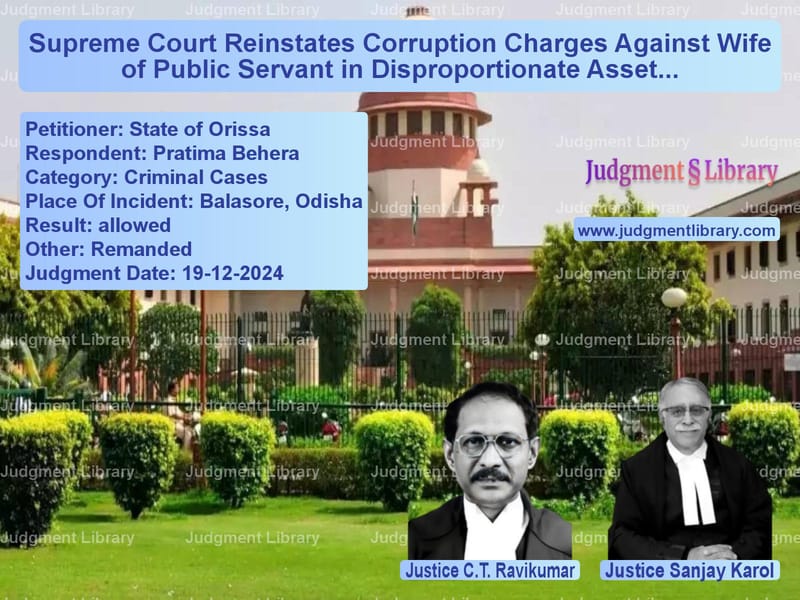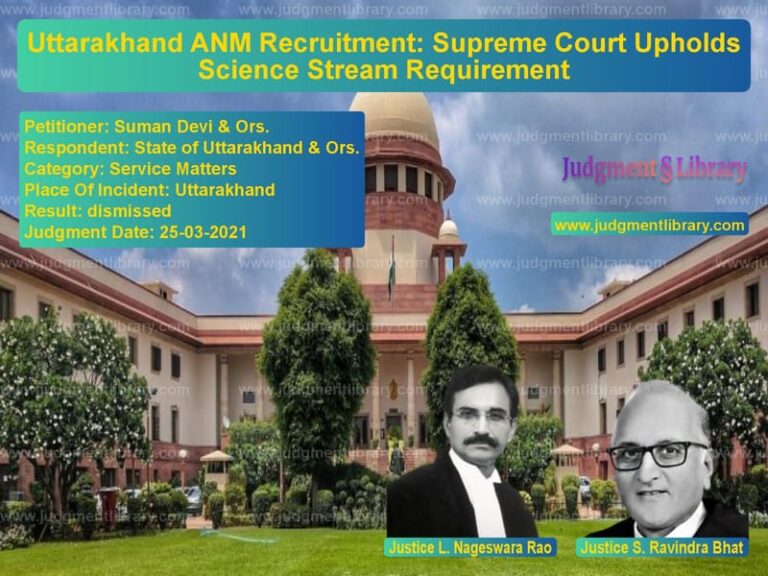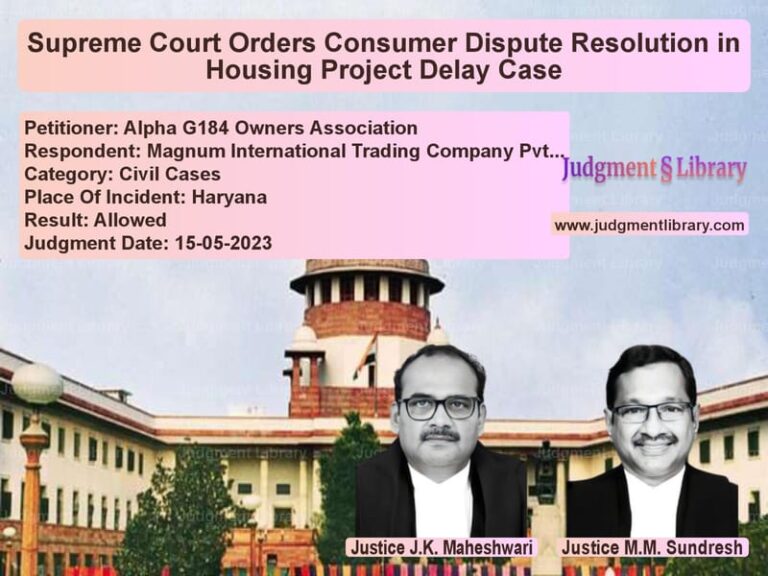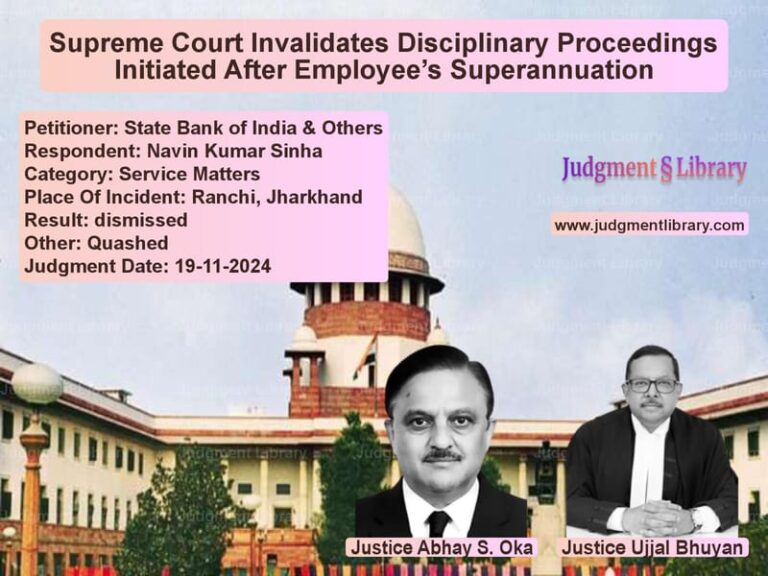Supreme Court Reinstates Corruption Charges Against Wife of Public Servant in Disproportionate Assets Case
The Supreme Court of India has reinstated corruption charges against Pratima Behera in a case involving disproportionate assets accumulated by her husband, a public servant. The judgment overturns the decision of the Orissa High Court, which had quashed the charges against Behera under Section 109 of the Indian Penal Code (IPC) and Section 13(1)(e) read with Section 13(2) of the Prevention of Corruption (PC) Act, 1988. The Court ruled that the prosecution had presented sufficient material to establish a prima facie case and that the trial should proceed.
Background of the Case
The case originated from an FIR filed against Anil Kumar Sethi, an Assistant Engineer in the Rural Works Sub-Division, Kakatpur, Puri, on allegations of possessing assets disproportionate to his known sources of income. The investigation led to charges against his wife, Pratima Behera, based on the following findings:
- FIR Registered: 25.11.2019 (Crime No. 56/2009) under Section 13(1)(e) read with Section 13(2) of the PC Act.
- Disproportionate Assets: Anil Kumar Sethi was found to have assets worth ₹40,54,561, which was calculated to be 155% more than his known income of ₹25,81,494 during the check period (03.09.1993 – 26.08.2009).
- Role of Pratima Behera: Some of the assets were found in her name, but she failed to substantiate her independent sources of income.
- Missing Tax Records: Behera claimed to have filed Income Tax Returns (ITRs), but the investigation found no records in the Income Tax Department.
Trial Court’s Ruling
In 2016, the Special Judge (Vigilance), Balasore, rejected Behera’s discharge petition under Section 239 of the Criminal Procedure Code (CrPC), stating that the prosecution had presented a prima facie case.
High Court’s Ruling
In 2017, the Orissa High Court reversed the Trial Court’s decision, quashing the charges against Behera. The Court held that there was no direct evidence to show that she had conspired with or abetted her husband in acquiring disproportionate assets.
Supreme Court’s Examination
A bench comprising Justices C.T. Ravikumar and Sanjay Karol reviewed the case and set aside the High Court’s order, allowing the trial to continue.
1. The Scope of Section 239 CrPC
The Supreme Court ruled that the High Court exceeded its jurisdiction in quashing the charges at the discharge stage. The Court held:
“At the stage of framing charges, what is to be examined is whether a prima facie case exists, not whether there is clinching evidence of guilt.”
2. Income Tax Returns and Suspicious Transactions
The Supreme Court noted that Behera failed to provide original tax return receipts, and the records were missing from the IT Department. The judgment stated:
“The Investigating Officer made repeated attempts to verify the income tax records of the respondent, but they were unavailable. This raises serious concerns about the legitimacy of the assets in question.”
3. Presumption Under the PC Act
The Court emphasized that under the PC Act, the burden of proof shifts to the accused to explain the source of disproportionate assets. The ruling stated:
“Once it is shown that a public servant possesses assets beyond his known sources of income, the law presumes them to be acquired through illegal means unless proven otherwise.”
4. Joint Ownership and Abetment
The Court rejected Behera’s claim that merely being the wife of the accused did not make her liable. It held that the prosecution had enough evidence to establish her role in handling and holding suspicious assets.
Final Judgment
The Supreme Court ruled:
- The Orissa High Court’s order was set aside.
- The Special Judge’s order framing charges was restored.
- Pratima Behera will face trial under the Prevention of Corruption Act and IPC.
- The Trial Court was directed to expedite the proceedings.
Implications of the Judgment
This ruling has significant implications for corruption trials in India:
1. Courts Must Avoid Premature Discharge of Accused
The ruling reinforces that charges should not be quashed at an early stage if a prima facie case exists.
2. Burden of Proof in Corruption Cases
The judgment clarifies that in disproportionate asset cases, the accused must prove that their assets were acquired legally.
3. Spouses Can Be Prosecuted for Abetment
The decision affirms that if a spouse is found to be a conduit in corruption, they can be prosecuted.
Conclusion
The Supreme Court’s decision in State of Orissa vs. Pratima Behera strengthens the legal framework against corruption. By reinstating the charges, the Court emphasized the importance of due process and the necessity of thoroughly examining suspicious financial transactions. The ruling ensures that public servants and their associates cannot escape accountability through procedural loopholes.
Petitioner Name: State of Orissa.Respondent Name: Pratima Behera.Judgment By: Justice C.T. Ravikumar, Justice Sanjay Karol.Place Of Incident: Balasore, Odisha.Judgment Date: 19-12-2024.
Don’t miss out on the full details! Download the complete judgment in PDF format below and gain valuable insights instantly!
Download Judgment: state-of-orissa-vs-pratima-behera-supreme-court-of-india-judgment-dated-19-12-2024.pdf
Directly Download Judgment: Directly download this Judgment
See all petitions in Money Laundering Cases
See all petitions in Fraud and Forgery
See all petitions in Public Sector Employees
See all petitions in Judgment by C.T. Ravikumar
See all petitions in Judgment by Sanjay Karol
See all petitions in allowed
See all petitions in Remanded
See all petitions in supreme court of India judgments December 2024
See all petitions in 2024 judgments
See all posts in Criminal Cases Category
See all allowed petitions in Criminal Cases Category
See all Dismissed petitions in Criminal Cases Category
See all partially allowed petitions in Criminal Cases Category







